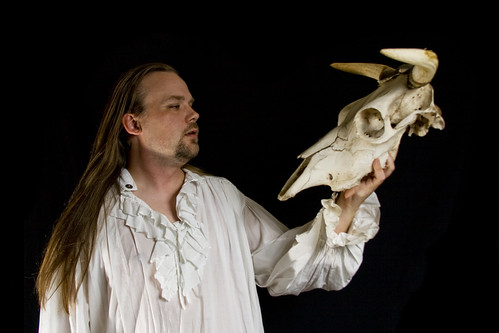 I realize this movie came out four years ago, but I just watched the movie Adaptation
I realize this movie came out four years ago, but I just watched the movie Adaptation this weekend. My parents bought it for me when it came out on DVD; Mom said she thought it was weird so I'd probably like it. That was intriguing but for whatever reason I never got around to watching it.
Honestly I think the reason I never watched it is that the third line of the back summary describes one of the characters as "obsessive orchid hunter," and I think, how can this possibly be interesting? I think I probably stopped there. I didn't bother to re-read it before Matt and I watched it the other night, so I didn't really have any expectations.
It is about orchids, somewhat, which weirded me out since my friend Kim posted a picture of an orchid yesterday. Mostly, although the film revolves around orchids, it's not about orchids at all.  So we've all heard of meta-fiction but I haven't really considered its applications in film. The closest I've seen is when a character addresses the audience, interrupting the movie and reminding everyone that they're watching one. This is uncommon and generally clumsy in film though it appears more frequently on stage. The theory I'd guess is if Shakespeare did it, it must be ok.
So we've all heard of meta-fiction but I haven't really considered its applications in film. The closest I've seen is when a character addresses the audience, interrupting the movie and reminding everyone that they're watching one. This is uncommon and generally clumsy in film though it appears more frequently on stage. The theory I'd guess is if Shakespeare did it, it must be ok.
Adaptation goes much further than simply addressing the audience however (and never in fact directly addresses the audience). The screenplay, by Charlie Kaufman, is about the character Charlie Kaufman (played by Nicolas Cage) writing a screenplay adaptation. The adaptation is of a book called The Orchid Thief, which is a real book, written by Susan Orlean both in the movie and in real life. It quotes passages from the book which I suspect are real passages. The movie plays with reality continually, with main characters who are all real people, Charlie Kaufman, Susan Orlean and John Laroche. It even includes a seminar by real speaker Robert McKee, played by Brian Cox. The exception is Kaufman's twin brother Donald who is fictional, but reality is further blurred by giving Donald credit for co-writing the screenplay, and actually dedicating the movie to his memory since he "dies" during filming.
 While most people call Kaufman's work surrealist, I'd also call this movie a beautiful example of meta-film. Cage, as Kaufman, is constantly struggling with writing the screenplay that we're watching. He decides to put in elements which we will, or have already witnessed, and ends the movie by telling us in a voice over that he'll end the movie with a voice over, ending as it ends.
While most people call Kaufman's work surrealist, I'd also call this movie a beautiful example of meta-film. Cage, as Kaufman, is constantly struggling with writing the screenplay that we're watching. He decides to put in elements which we will, or have already witnessed, and ends the movie by telling us in a voice over that he'll end the movie with a voice over, ending as it ends.
There are some wonderful moments in the movie (warning: spoilers). Early in the movie a passage from the book talks about the fatal nature of orchid hunting, giving stories of orchid hunters who've died in their obsession. This sets us up beautifully for the deadly ending which would otherwise be overblown. Orlean (Streep), drugged out of her mind on orchid dust, says, flatly and with hilarious predictability, "We're going to have to kill him." Although the moment is obvious should seem overplayed, it's balanced by earlier comments by Kaufman about similar movie elements being predictable and overdone.
After watching this movie I'm not at all surprised that the same man wrote Being John Malkovich and Eternal Sunshine Of The Spotless Mind
. I think one of the strongest points of the movie (of all the movies) is that although it uses meta-fiction devices and surrealist elements, the movie avoids being about its own devices.
 Orlean makes comments in her narrative about wanting nothing more than to want something, and this reflects Kaufman's struggle. Although he is not lacking desire, he's so terrified of acting on them that he's paralyzed inside his dark shell of a bedroom. This is a movie about isolation, about people who need to be released from their inhibitions to make any kind of human connection.
Orlean makes comments in her narrative about wanting nothing more than to want something, and this reflects Kaufman's struggle. Although he is not lacking desire, he's so terrified of acting on them that he's paralyzed inside his dark shell of a bedroom. This is a movie about isolation, about people who need to be released from their inhibitions to make any kind of human connection.
*Pictures are stolen and link to wherever I stole them from.
A Certain Lack of Focus
Tuesday, December 18, 2007
Adapting
Subscribe to:
Post Comments (Atom)



1 comment:
Hmm. Now you have me interested. For some reason, I thought that Scarlett Johansson was in this, and I don't like her at all--hence my initial reserve. She's a movie-breaker for me, much like Jim Carrey is.
Post a Comment